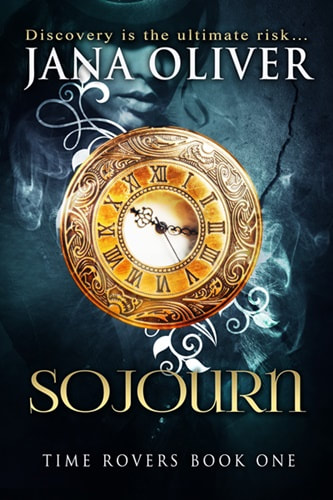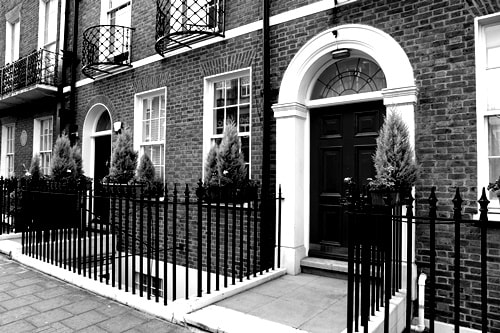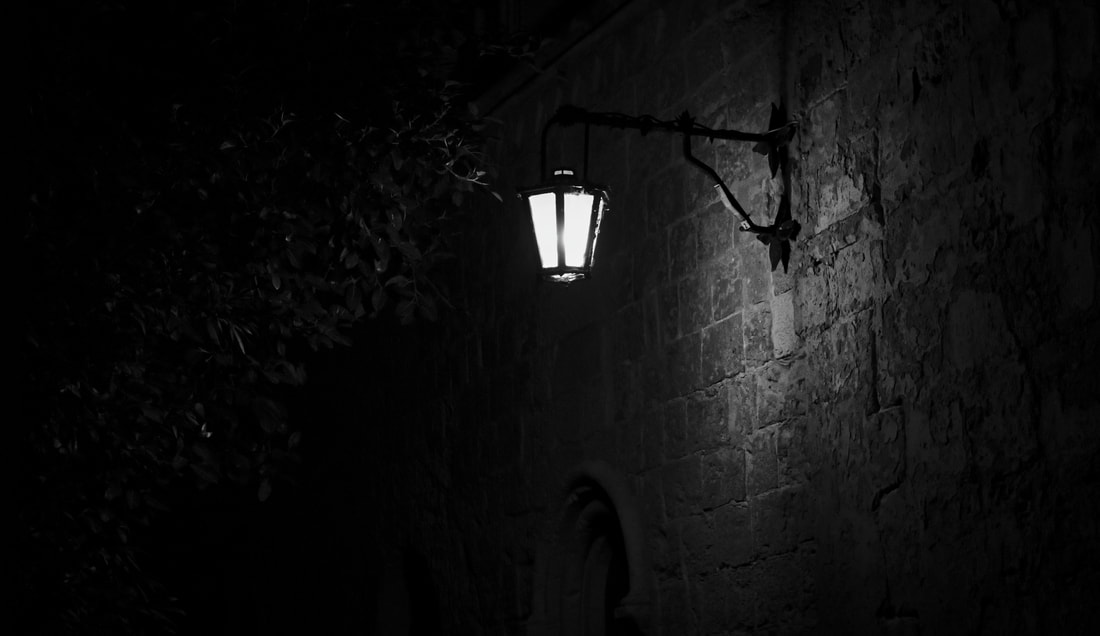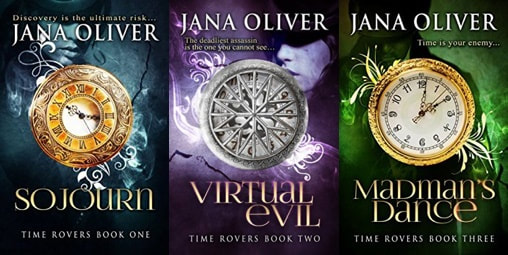|
CHAPTER TWO Monday, 24 September, 1888 London Pressing the coins into the hansom driver’s rough hand, Alastair shook his head at the question. “No, you do not need to wait.” “As you wish, sir,” the jarvey replied, touching his battered cap in respect. He jiggled the reins, and the cab clattered down the street. Alastair watched it turn the corner as he dropped the remaining coins into his pocket. He regretted spending the money, but he’d run late at the hospital, forcing him to secure a ride to Marylebone. Flipping open his pocket watch revealed it was three minutes until five. He would be on time. Alastair released a deep sigh as he mounted the stairs to the house. It was a three-story, white stone affair with a glowing gas lamp at the front door. It spoke of money, but then Lord Wescomb was a well-regarded barrister and came from landed gentry. He could easily have afforded a house in Knightsbridge or Mayfair, but preferred to be close to the law courts. Alastair turned toward the clean and well-lit street. He’d once lived in a place like this, free of worry, free to spend a few coins on a cab journey. All that lay in the past now. After another deep breath, he knocked on the carved oak door. The maid promptly answered. “Doctor Alastair Montrose to see Lord and Lady Wescomb, at their request,” he said politely. Summoned to their presence was more like it. The note he’d received, while cordial, did not allow him the option to decline. “This way, Doctor,” the maid replied. Alastair stepped inside, glancing about as inconspicuously as possible. The carpets proved richly hued and the walls were of the finest hardwood. The delicate scent of flowers caught his nose. He found the source; an elegant lead crystal vase filled with an abundance of colorful blooms. Chagrined, he realized the maid waited. He removed his coat and hat, passing them to her. She hung them on a hall tree, exhibiting a calm demeanor he wished he could borrow. Perhaps the Wescombs wish to donate to the clinic. His mind immediately discarded that fanciful notion. This summons was something else altogether. Alastair took time to straighten his tie and jacket in the hall mirror, smoothing his hair and moustache. He looked as presentable as a young physician might, given his reduced circumstances. He’d made a point of wearing his best suit and polishing his shoes. A downward glance revealed they’d survived the journey in tolerable shape. “They’re in his lordship’s study,” the maid advised, gesturing down the long hall. When they reached their destination, Alastair hesitated at the study door, as if retreat remained an option. Inside, he heard the reassuring sounds of a crackling fire and low voices. The maid gave him an inquisitive look. He nodded for her to proceed. She knocked and was readily granted entrance. The room proved surprisingly intimate, with tall bookshelves on three walls and a massive hearth on the fourth. Lady Sephora Wescomb sat in a brocade chair near the stone fireplace, her intelligent eyes observing him with a hawk’s intensity. Her silvered hair glinted in the gaslight in contrast to her deep-purple gown. It was cut in the latest fashion, with black lace at the bosom and at the cuffs. Her husband, Lord Wescomb, leaned back in a heavily padded chair with a faint look of amusement, adjusting his embroidered waistcoat over a slight paunch. Alastair delivered a nod in his lordship’s direction and it was returned. He followed suit with the lady of the house. “Come in, Doctor,” Lady Sephora commanded, executing a graceful gesture toward a chair set equidistant between herself and her husband. “Thank you, Lady Wescomb,” Alastair replied as the maid closed the door behind him. “You haven’t changed a bit, young man,” Lord Wescomb observed with a bemused chuckle. “Thank you, my lord.” Alastair settled into the chair, ill at ease. A glass of sherry rested on a walnut table near his elbow. He reached for the liquor and sipped, waiting for his hosts to open the conversation. Lady Sephora’s form abruptly shifted, strawberry-blonde tresses replacing the silver, her matronly figure exchanged for a girlish shape. Wescomb altered as well, his hair now dark and his face thin. Indeed, the pair now appeared as they might have two decades earlier. “Are you not going en mirage?” Lady Sephora’s voice matched her youthful appearance. Alastair shook his head. “No, thank you. I have no need to do so.” The moment after he spoke, he inwardly grimaced. He’d foolishly reminded his hosts of his aberrant behavior. “Surely you go en mirage on occasion,” she said. “No, I don’t.” The Wescombs traded looks. “Not at all?” Lady Sephora pressed, adopting a puzzled tone. Alastair felt the trap closing. “No.” The low sigh from his hostess sounded like a reproof. In contrast, Lord Wescomb’s face gained a slight smile. “You always were a maverick,” he said. From his lordship’s mouth, it sounded like a blessing. “I am not like the others, my lord.” “In that you are wrong,” Wescomb retorted, his voice changing timbre in an instant. “You are more one of us than you wish to believe.” Alastair drained the liquor, set the delicate crystal glass on the table and rose, knowing he risked angering his hosts with such an abrupt departure. “Thank you for the sherry. If that is all, I must––” “Please, Doctor,” Lady Sephora urged, gesturing toward the empty chair. “Don’t make a scene. We are merely concerned for your health.” “I appreciate your concern; however, I cannot live as you prescribe. I do not wish to embrace this…transitory existence you so readily cultivate.” An awkward moment ensued; the urge to flee barely held in check by the social graces. Alastair stared into the fire, debating his next move. The gaslights on either side of the mantel hissed into the silence. “I understand you no longer practice with Dr. Hanson in Mayfair,” Lord Wescomb said. Sensing a merciful shift of topic, Alastair returned to his seat. He elected not to ask how his host knew about his change of venue. Apparently, the Transitive community paid more attention to him than he cared to admit. “Yes, there have been changes in my professional life. I now practice at the London Hospital and a small clinic in Whitechapel.” “I see. Do you enjoy your work at the clinic?” Wescomb asked, leaning forward in his chair. Alastair gave a faint smile. “Infinitely so. The conditions are of the most primitive nature, and the people of the lowest sort, but they are grateful for any help they receive. They have so little.” “Indeed.” “When did you begin your work in Whitechapel?” Lady Sephora asked. The relevance of the question puzzled Alastair. “In mid-July.” “I understand that Dr. Hanson was quite displeased with you,” Wescomb said. “We disagreed as to which patients I should treat.” “What I heard about that young boy was true, then?” Wescomb asked. Alastair shifted uncomfortably, adjusting his jacket. What was the purpose of this close questioning? “Dr. Hanson refused to allow me to treat the injured boy in the surgery. He didn’t want our patients to think we attended those of the lesser classes, as he put it.” Alastair’s jaw tightened at the memory of their argument. “We have been to the East End, en mirage. It was most disheartening,” Lady Sephora observed with a distant expression on her face, as if she could still see the filthy streets and the ragged ghosts that inhabited them. “They want for the most basic necessities,” Alastair said. “What of Hanson’s daughter, Evelyn? Are you still engaged?” Wescomb asked out of the blue. The query snapped Alastair back to the moment. He noted the pair switched back and forth, as if this had been rehearsed. “We have broken our engagement. Evelyn has requested that I no longer see her. She cannot fathom why I wish to treat the poor. She deems it a waste of my talent.” “Not surprising,” Wescomb huffed. “Evelyn always struck me as quite shallow. I said the same to Sephora after the first time I met her.” Lady Sephora nodded. “Which I believe was the first time we met you, Doctor. At the Endicotts’ party. You and Evelyn never seemed to be a matched set, if you follow my meaning.” Alastair opened his mouth to protest, then abandoned the effort. They were correct, though it stung to admit it. Evelyn heeded her father in all things, even the matter of a potential husband. Alastair’s eyes drifted to his hostess. Sephora Wescomb was the converse of young Evelyn; she valued her independence and exercised her brilliant mind regularly, much to the annoyance of most males. Lord Wescomb seemed to comprehend that his wife was as rare as a clear day in London and should be cherished as such. “Are you courting someone at present?” the lady asked after a diminutive sip of sherry. That was over the mark. “Is there some reason I’m here?” Alastair asked, chafing to be away from the probing questions. Wescomb replied, “We’ve been instructed to make these inquiries, Doctor.” “By The Conclave?” A brusque nod. “There are rare few of our kind that do not go en mirage, and The Conclave wishes to ascertain your mental health. It is not regarded as wholesome to avoid our true natures.” “I am not unbalanced, if that is your concern.” “Perhaps not yet. Still, you live outside the rules, and especially during this time it is dangerous to do so,” Wescomb advised. “I remain circumspect. I don’t flaunt myself like Keats.” Wescomb quickly nodded in agreement. “Keats does have his fun, but be assured that at present, all are under orders to appear as pedestrian as our fellow citizens. What with these unseemly murders in the East End, it is vital that we remain out of public scrutiny.” “Then how does my behavior present a problem?” “Our particular endowment must be exercised or it will run amok,” the lady cautioned. Alastair shook his head. “It never has with me. I have control of it.” Lady Sephora’s expression grew stern. “So you have said in the past, and I must admit you have mastered your need to go en mirage quite well. However, even the best of us will eventually succumb––” Alastair rose abruptly. “I resent the implication that I cannot keep myself in check.” Wescomb rose as well, and his voice took on a hard edge. “If my good lady and I are unable to overcome this…predilection, then why do you believe you are so invincible?” “With all due respect, Lord Wescomb, I just am. May I now be excused?” His hosts studied each other until Lady Sephora gave a resigned nod. “Please be cautious, Doctor. Many eyes are upon you,” she said. “As always, my lady,” he replied with open discontent. Without further pleasantries, he departed the room at a brisk march. Brushing aside the maid’s assistance at the front door, Alastair collected his coat and hat and exited onto the street. Twilight hung in the air. The street’s deepening shadows matched his mood. Inside the study, Wescomb sank into his chair with a long exhalation. “The boy is riding for a fall, I think. No one is capable of denying our legacy. He is a fool to think he can.” His wife rose and closed the door in a rustle of silk. “He’ll learn it soon enough.” “What will The Conclave do?” Wescomb asked. “I am not sure,” she said. “They are so skittish at present. Knowing they have a rogue, even one as well mannered as Alastair, may cause them to react irrationally. They are most adamant that our young doctor be held accountable for his unhealthy behavior.” “Let us hope this East End lunatic ceases his reign of terror and normalcy returns.” The lady’s face grew thoughtful as she returned to her chair. “And that the fiend is not one of ours.” Wescomb shook his head vigorously. “Good God, Sephora, I really can’t believe––” “It does not matter what either of us believes, John! It’s what The Conclave presumes. If they are convinced that Alastair is behind this butchery . . . ” Silence descended as each mulled the implications. Wescomb poured himself another glass of sherry. His wife held out hers, and he performed the honors. She studied the amber liquor. “We must pray for Alastair’s future . . . and his sanity,” she said softly. Wescomb nodded solemnly. They drained their drinks. After only a moment’s hesitation, both hurled the crystal into the blazing fireplace. The remnants of the alcohol flared brilliantly, and then vanished in the flames. ~••~••~••~ It took many blocks before Alastair’s temper cooled, his anger replaced by gnawing unease. A sensible man wouldn’t have lost his temper. The Wescombs had shrewdly attacked his weakest point: the urge to go en mirage. By resisting it, the urge only grew stronger. Though the Wescombs were circumspect in their practices, others of his kind regularly adopted bizarre forms and saw it as a grand charade. “It’s still a dangerous game,” he muttered, “and I shall not play it.” When he became aware of his surroundings, he found himself on Threadneedle Street near the Bank of England. Pausing at an intersection, on a whim Alastair cut south toward the Thames, keen to judge how the new bridge was progressing. Something about the nascent structure always brightened his spirits, gave him hope. As he stood along the riverside near the Tower of London, a slight breeze danced over the Thames. In the distance, he could see the massive concrete piers breaking the surface like two continents rising from the depths. Fascinated at this marvel of engineering, he’d eagerly followed the news articles, relishing every minor detail. He could hardly wait until the first time the structure’s twin spans rose heavenward to allow a ship to pass beneath. “Amazing,” he murmured. Shifting his gaze toward the East End, he felt his melancholy return, descending on him like a thick London ‘particular’. “Such deprivation within sight of such a marvel. How can it be like that?” he mused. The Tower of London’s high gray walls loomed in the darkness as he hiked the Minories and then north toward St. Botolph’s Church. As always, he was transfixed by the women trolling the exterior, circumnavigating the church like fallen angels in search of holy redemption. They’d learned that if they kept moving, they wouldn’t be arrested for prostitution. Various offers came his way, but he ignored them as he made his trek along Whitechapel High Street and then onto Commercial Street. The thoroughfare bustled with bodies; costermongers hawked their fruits and vegetables in strident voices. A newsboy chanted the latest scandal while a potman dished out pints of porter and stout to waiting customers. A lamplighter descended to the street, his task complete. Above him, the gas lamp spread its limited glow. “All-a-bloomin’,” a flower merchant called as a young man chose a red rose for his sweetheart. The grating squeak of a wheelbarrow announced a scrap iron merchant wending his way through the teeming throng. “Sir, spare tuppence? I can get a bed if you do that, sir,” a tattered woman wearing a threadbare shawl called from her place on the street. Before her sat a battered wooden bowl inhabited by a solitary copper coin. Alastair knelt and placed two pence in the woman’s hand, rolling her dirty fingers over the disks. She blinked in surprise at his touch. “Bless you, sir,” she said. “I’ll not use it for drink. I swear it.” “I know.” He could ill afford to give away even a few pence, but something about the woman struck his heart. “May God bless you,” he said as he rose. Partially obscured in the shadows of a doorway, a young woman asked in a husky voice, “Fancy some company, luv?” Alastair ignored her. She persisted, catching up with him as he navigated his way through the dense crowd. “Come now, luv, don’t be that way.” He gave her a sharp look. Something felt odd, though her appearance gave no doubt as to her station in life: a plain, lower-class girl wearing a cheap straw hat, mismatched clothes and carrying a worn umbrella. Grabbing his arm, she forced him to match her pace. A strange tingle flooded through him, heralding the presence of one of his kind en mirage. Only one person would be so bold as to approach him in this manner. Alastair glared and whispered, “By the devil, Keats, is that you?” The young woman tittered. “Why do you think that?” Indeed, it was Jonathon Keats, the rascal who claimed to be his friend. Alastair tried to shake himself free, but his companion clutched his arm like a beggar would a gold sovereign. “Stop squirming,” the girl whispered, and then flashed a smile at a passing tradesman. “You’ll attract attention.” That was rich. “What are you doing?” “Hunting the killer, you see,” Keats replied in a conspiratorial whisper, revealing no hint of the man underneath. “Do you not realize the danger your stunt poses?” “I’m not the one who was summoned to our lordship’s house tonight.” Leaning in closer, pressing against his forearm, Keats asked, “Just how did that go? Did they give you twenty whacks on the bum and make you stand in the corner?” This time, Alastair did manage to shake the nuisance free, and none too gently. In a swift gesture, he propelled them down an alley. Jamming her up against the sooty brickwork, he snarled, “How did you know I was with the Wescombs?” Was Keats spying on him for The Conclave? “Oh, really, Alastair. Your name is on quite a few lips, old boy. Word is that you’ve gone Opaque on us.” Alastair’s mouth twitched. “I prefer not to play around like you do,” he retorted. “I don’t play; I conduct experiments,” Keats announced in a grand tone. “Just like any great scientist.” “Just like any proper madman, you mean.” A couple entered the alley: a tradesman and a prostitute by the looks of them. After a quick glance in their direction, the woman hiked her skirts and leaned back against the brick wall as the man undid his pants, seemingly unconcerned that they were not alone. “Oh, God,” Alastair said, averting his eyes. With a smirk, his companion did the same. “Just a knee-trembler,” Keats said, employing the vernacular. “Nothing to be alarmed about. In fact, if you want to blend in,” she said, mischievously reaching for her skirts. Alastair shoved the irritant further along the dark alley. “Why does The Conclave care what I’m doing?” he whispered, mindful of the couple behind them. That earned him an amused look. “You confound them. You don’t play by the rules. They’re uneasy with anyone who doesn’t blindly follow their lead.” “I am minding my own business. Can’t they see that?” Alastair insisted “No, they can’t. Besides, this isn’t all fun and frolic,” Keats said, his voice less gleeful than before. “It’s what we need to do to survive. Fortunately, it harms no one . . . unlike some vices.” Alastair glared. “I will debate that last statement until my dying day.” “Which might not be too far away if you keep denying your heritage, my friend,” Keats remarked. “You know what that can cause.” “I shall not become . . . unstable.” Keats shrugged. “Old Roger Diamond said the same thing. I’ve heard he’s confined in a straitjacket now, thumping his brains against the walls of his family’s manor house in Dorset.” “I am not so inclined,” Alastair persisted. “Maybe not, but they prefer predictability.” “I’m quite predictable,” he protested, his voice rising higher than he intended. “Nonsense. Predictable people don’t toss away their future over some street waif. Predictable people,” Keats paused and then continued in a lowered voice, “go about en mirage on occasion. You, however, are as opaque as…” She gestured toward the pair at the other end of the alley. At that, the tradesman gave a short grunt and then stepped back, buttoning his trousers. The prostitute dropped her skirts. “Bless ya, luv,” she said, humming to herself as they left the alley. They parted at the street, the act of dispassionate commerce complete. Keats shook his head in dismay. “Despite the killer, they still go off with strangers. I just don’t understand.” Alastair grasped the illusion’s arm and marched toward the street. “I’ve had quite enough of you for one evening.” “Treat me nice,” Keats teased. “If I give a shout, the crowd will be on you like a pack of hounds. From what I hear, you’re about the killer’s height and your hair is nearly the same color. Might take a bit of time for the mob to realize they’ve got the wrong fellow.” Alastair released her, unsure if the crank might pull such a stunt. He straightened his jacket, then strode toward the street, hoping Keats wouldn’t rejoin him. The pest appeared at his side, eyeing passing gentlemen with stealthy glances. “Mindless twit,” Alastair grumbled. “Don’t you have someone else to torment?” His companion turned serious in a flash. He latched onto Alastair’s arm again, leaning close. “Be careful,” Keats whispered. “On all accounts. I would miss your gloomy person more than you might realize.” After disengaging herself, Keats adopted a saucy walk, veering toward the mangle of bodies loitering outside the Princess Alice. The moment before crossing the threshold into the pub, she executed a short wave. “Bloody lunatic,” Alastair muttered. “He’s the one they should be worrying about, not me.” In time, the doctor reached the ramshackle building on Church Street that housed the clinic, a tailor’s shop, a saddle maker and ten families squashed into tiny, airless rooms. Situated on the ground floor in a space no more than fifteen by fifteen in size, the clinic consisted of two wooden tables, a few benches and an endless supply of the sick and injured. Tonight was no exception; all the benches were full. Some of the patients held their heads, while others had barking coughs. One man cradled his injured arm, a thick line of blood congealing on his shirt. Alastair’s fellow physician, Daniel Cohen, was attempting to place a stethoscope on a sobbing toddler’s chest. He glanced up, spied Alastair, and then shook his head in disapproval. “I won’t bother arguing with you,” Daniel called over the noise. “You won’t listen to me anyway.” “You need help tonight,” Alastair replied, removing his hat, coat and jacket. “You require a night at leisure,” Daniel replied. The recalcitrant child grasped the stethoscope and tugged on it playfully. Daniel obliged by placing it on the youngster’s chest. “I’ll take tomorrow night off,” Alastair said, rolling up his sleeves. “So you always say,” was the curt reply. Alastair crossed to a cabinet and tucked his garments inside to prevent them from being stolen and pawned for ready money. He gestured for the next patient to come forward: an older man spitting blood into a dingy grey handkerchief. At least here no one questioned his sanity. Sojourn Time Rovers Book 1 Copyright ©2006 Jana Oliver Cover image courtesy of Yocla Designs All rights reserved. No part of this book may be reproduced or transmitted in any form or by any means now known or hereinafter invented, electronic or mechanical, including but not limited to photocopying, recording, or by an information storage and retrieval system, without the written permission of the Publisher, except where permitted by law. Comments are closed.
|
Jana Oliveris an international & multi award-winning author in various genres including young adult, urban fantasy and paranormal romance. Archives
November 2023
Categories
All
|




 RSS Feed
RSS Feed